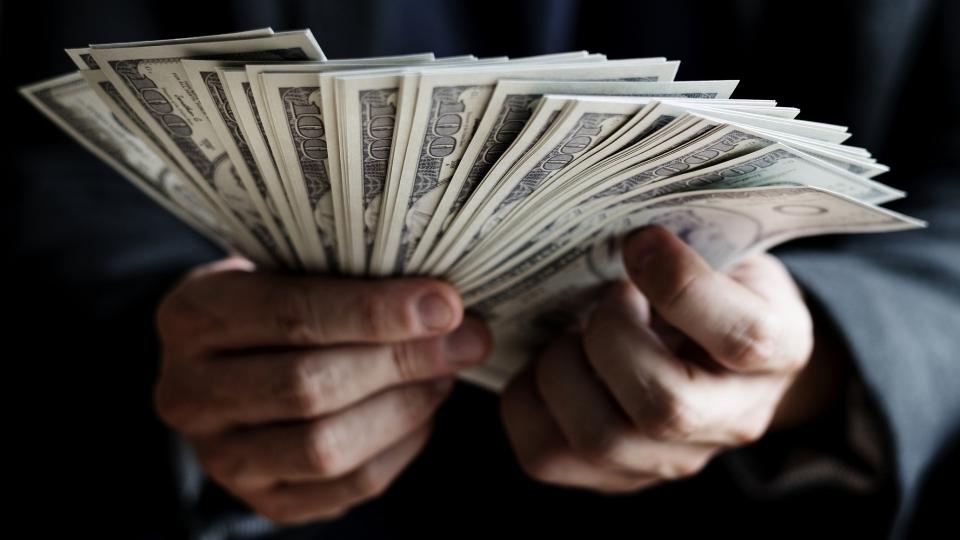Part of the reason so many lottery winners and heirs blow their windfalls shortly after getting rich is that they never learned the skills to manage, guard and grow that kind of money. The other reason is that they never had to sweat, sacrifice and risk to grow the fortunes that fell in their laps.
Grant Cardone: Passive Income Is the Key To Building Wealth — Here’s My No. 1 Tip
Find Out: How To Get Cash Back on Your Everyday Purchases
But self-made millionaires know just how hard it is to build riches worth seven figures — and they’re in no rush to return to where they started. Toiling your way to wealth tends to breed financial discipline, which means passing on things that you might want and can afford. That’s how you turn a small fortune into a large one.
Sponsored: Owe the IRS $10K or more? Schedule a FREE consultation to see if you qualify for tax relief.
A Millionaire Guards His Wealth After Almost Losing It All
Brian Crane is the founder and CEO of Spread Great Ideas, a multi-million dollar fund that invests capital “and sweat equity” into digital businesses and e-commerce brands. He’s helped launch four multi-million-dollar companies, including Archives.com, which Ancestry.com acquired for $100 million three years after its launch.
His hard work paid off, and he’s now a self-made millionaire — but you wouldn’t know it by looking at his lifestyle.
“I learned the hard way very early in my entrepreneurship journey that splurging without the correct checks and balances can make one a pauper,” said Crane. “When I sold my first company in my late 20s, I made some foolish investment decisions that brought me close to bankruptcy. I am lucky that I learned fast.”
Here are the things he doesn’t splurge on to ensure he doesn’t repeat his early career mistakes and risk all that he’s worked so hard to build.
Check Out: 7 Things the Middle Class Spends Money on That Hurts Their Chances of Being Rich
Designer Luxury Brands
Movie, music and sports stars are infamous for squandering their fortunes on shiny things and status symbols that social media influencers peddle without mentioning that they’re depreciating assets.
Crane wants nothing to do with any of it. His favorite status symbol is one you can’t wear, drive or fly — a bulging bank account.
“With truckloads of money, you may be enticed to buy the flashiest, trendiest stuff, whether apparel or cars,” he said. “Know and understand the importance of quality and cost. Remember that when you put depreciation costs into effect, the luxury brands can punch a hole in your pocket, which you could have used to buy quality apparel from a cheaper store. Extravagance may look good to the eyes, but you can do better by putting the same money into more appropriate investments.”
Mansions
The ultimate status symbol is an opulent house tricked out with premium décor and pricey tech. But giant houses come with giant bills — and they can be very hard to sell once the nouveau riche realize they’re in over their heads.
“Most millionaires invest in luxury houses, only to find a way to flip them at a higher cost or rent it away and make some side money from the asset,” said Crane. “There is no point in splurging on huge houses if you are never going to use the eleventh bedroom or bathroom. The truly rich people become rich not by splurging but by investing in profitable, money-making assets that give them favorable returns over time.”
Ultra-Luxe Leisure and Entertainment
The recklessly rich all share a proclivity for two things that advertise their wealth. The first is stuff — high-end designer bags, apparel and accessories, fast cars, fancy houses and the rest, like the kind that Crane described.
The second is the good life, which you can watch influencers living and faking all day long on social media.
“Eating from gold-plated cutlery may look good on Instagram, but splurging to maintain your appearance and leisurely activities can waste resources,” said Crane. “High-end entertainment, like going on costly offshore vacations, eating from the choicest restaurants or splurging on private jet travel, may look good in magazines, but the rags-to-riches millionaire always keeps a check on what he puts money on.”
He concluded, “In today’s world, where you can have the same experiences for a lot less, wasting money on these fleeting moments must be avoided.”
Another Avoids Little Luxuries That Add Up Over Time
Jared Bauman has nearly 20 years of experience in business management and digital marketing. His company, 201 Creative, counts corporations like Disney and Universal among its clients, and Bauman — who has started and sold several businesses — is an in-demand speaker.
He’s also a millionaire, and, like Crane, he shuns flashy advertisements of personal wealth. “Luxury cars and watches are fleeting status symbols I avoid,” he said.
But saying no to the obvious, big-ticket extravagance is the easy part. The true test of his financial discipline is in day-to-day life, when it comes time to say no to the affordable splurges that bleed you slowly over time.
“Overpriced coffee shops are an indulgence I skip,” said Bauman. “At the end of the day, I steer clear of anything that depletes my savings without providing real, lasting personal value. The habits that got me here keep me grounded while still enjoying the important things.”
More From GOBankingRates
This article originally appeared on GOBankingRates.com: I’m a Self-Made Millionaire: 4 Things To Stop Buying That Are a Waste of Money
Credit: Source link




